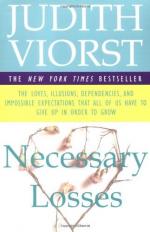|
This section contains 325 words (approx. 1 page at 400 words per page) |

|
Chapter 5 Summary and Analysis
Even an average mother is perceived by a child as perfect. Infants perceive their needs to be the same as their mother's. Only when separation occurs does it become clear that the two have a different set of needs, and that mother is a separate person with her own needs. Viorst thinks that our wish to "undo" that separation remains in some of us into adulthood, and that we are always seeking the unconditional love of mother's arms. She differentiates infantile, mature, immature and mature love, and feels there is always a grain of hatred in our love relationships. She quotes Winnicott, who argues that denying hate prevents "the developing child from facing and learning to tolerate his own hatred." Viorst thinks perhaps hatred is "nothing more than our expression of disappointed, deprived or frustrated love." Although philosophers disagree as to...
(read more from the Chapter 5 Summary)
|
This section contains 325 words (approx. 1 page at 400 words per page) |

|




